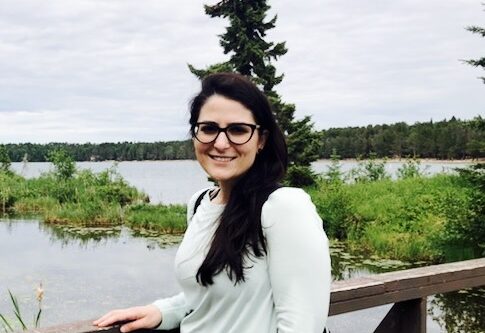Marathon doctor advises medical students to keep open mind about rural practice
Posted on August 23, 2022
Had she taken another path, Dr. Lily DeMiglio would probably be practising medicine in her hometown of Sault Ste. Marie. That’s what she first thought she’d do after graduating from NOSM University’s MD and family medicine residency programs. Little did she know that a community about 400km north of the Soo on the North Shore of mighty Lake Superior would win her heart.
Dr. DeMilgio says she always found Marathon to be very charming, but more than that, she fell in love with the broad scope of work she could practise as a rural generalist: from inpatient care to the emergency room, to work in the clinic and with First Nations communities. Dr. DeMiglio says she likes the flexibility of her schedule. “I have time for teaching and committee work. I’m not doing the same thing every day.
“I really like my lifestyle in Marathon.”
To adapt to the needs of her patients and the community, Dr. DeMiglio expands her skill set regularly—she is now a coroner, for example—and she recommends that others who practise as rural generalists embrace the opportunity to continue to learn.
“You’re not going to know everything. Over time, you do get that experience and when you don’t know, you can always phone a friend.”
That “phone a friend” mentality has shored Dr. DeMiglio up along the way, helping her to build personal resilience—and solve problems for patients.
“Medicine is so collegial. For me, a huge part of helping to sustain myself is reaching out to my medical school colleagues.”
“Your team is your physician colleagues,” she continues, “and your nursing colleagues. It’s everyone: the custodial staff, the administrative staff. In a rural community, you really need to draw on all hands.”
Rural practice does come with some very real challenges, she acknowledges, and sometimes rural physicians in the North are at the mercy of things very much outside of their control.
“I think about our geography,” she says. “I have had the worst luck with patients needing urgent care in a larger centre when the highway is closed and Ornge [Ontario’s air ambulance] isn’t flying.”
“Even though I have a broad scope of practise,” she continues, “at the end of the day, that patient needs a higher level of care. That can be hard to deal with. Looking back, you overcome those challenges by drawing on your team, and by doing the best that you can.”
No matter the drawbacks—and the fact that she can’t control the weather—Dr. DeMiglio says the rural North is the place for her.
“My greatest joy is the continuity of care that I have with my patients,” she says. “Following families, and following patients through their lifecourse. I value relationships, so it brings me a lot of joy.”
Dr. DeMiglio revels in helping aspiring medical learners on their paths. She recently won the NOSM University learner-nominated Teacher of the Year award. “Whenever I have students, it reinvigorates my passion for medicine.”
She offers learners these insights about the qualities of a good medical learner: “Be curious, be honest, be a good listener, and take every opportunity you can to get more clinical experience. Keep an open mind and know that you’re going to make mistakes. You don’t have to be perfect.”
As for her, Dr. DeMiglio says she finds purpose in being able to respond to a real need, and provide medical care to people in an underserved community.
“I feel grateful for having trained in the North,” she says. “I feel this need to give back.”
This NOSM University Campfire Chat was made possible by the generous sponsorship of Weaver Simmons.



